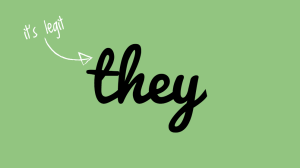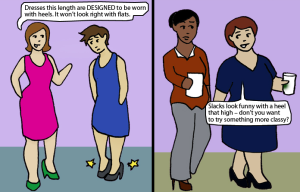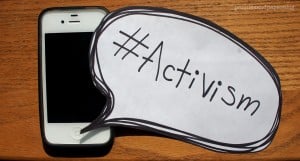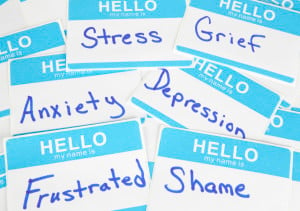
The word “they” is written in black cursive on a green background, with a white arrow pointing to it saying “it’s legit.”
Author’s Notes: I want to name where I am coming from in this piece. I am a non-binary, genderfluid, genderqueer, white, middle-class, AFAB, thin person, and that affects my work, although I do my best to enrich my knowledge with other perspectives.
I also solely use they/them/their pronouns. There are as many experiences with these and other pronouns as there are people in our community, and I can’t speak for everyone.
I also want to give a shout out to people who use other pronouns. They are also 100% real and legitimate, and people using those pronouns often face even more intense resistance and delegitimization.
My name is Adrian Ballou, and I use they/them/their pronouns.
Why would I do this? Why would I sign on for side eyes every time I meet someone new? Why would I sign up to correct the many “she” and occasional “he” pronouns thrown my way, every hour of every day?
It’s because of the clenching in my gut every time I hear a “she,” a stuttering “he,” a “mister” a “ma’am.” It’s because of the way the daily onslaught of “she,” if left unchecked, erases my sense of self.
I use they/them/their because “he/him” doesn’t fit, and “she/her” doesn’t fit either. They just feel clashing and clanging and wrong. I use they/them/their pronouns because, ironically, it’s the simplest option – even though I hear all the time about how hard it is for some people to use.
I use they/them/their because I must continue to hold onto myself, despite it all. Because I start to panic if I think of using she or he. Because, despite the onset of vitriol since I came out, I am more at peace inside myself even if the world has started its own new war with me.
I use they/them/their pronouns, and it most certainly is not frivolous. It is a way I survive.
My use of they/them/their pronouns is not only a necessity, it is a celebration of being myself despite it all. You might misgender me, but you cannot take that away.
Help us build that world, a world of whole selves.
Because as glittery and magical as I sometimes am, I get tired just like the rest of you. And some solidarity is really rad.
If you are looking for some shut-down arguments to common objections to they/them/their pronouns, here they are.
Use them well to assert the awesomeness of “they” with all the confused, all the haters, all the elitist grammarians.
And if you happen to be one of those folks? Take this stuff to heart.
1. It’s Grammatically Incorrect
This is people’s number one objection to they/them/their pronouns. Like, “My sense of elitist grammar is way more important than respecting who you are.”
Well, I love to destroy your sense of grammar by being myself. It’s part of my nefarious non-binary agenda.
This is a common grammatical confusion that has been explained in so many different places. Essentially, here’s the deal: They/them/their pronouns are part of a wider grammatical debate over “the singular they.”
For those of you who care about what elitist grammarians have to say, the singular they has even become recognized as “correct” English by the Oxford Dictionary. But for the record, our pronouns would still be legitimate even if no one supported the grammar behind it.
The singular they has been in use for hundreds of years, and is constantly in use today. We use the singular they all the time, so often that most people don’t even notice it. (I’ve even heard people using the singular they as they inform me why my pronouns are incorrect.)
It’s present in all sorts of sentences. “Everyone agreed that they were the winner.” “Oh, your friend is moving? Do you know when they’re leaving?”
This is the sense that most of us who use they/them/their pronouns mean it: We’re taking something that is already used as a common form of speech and applying it to one person, as a personal pronoun.
2. It’s Plural – And You’re Just One Person
I actually had someone ask me when I first came out: “Do you use ‘we’ pronouns now, too?”
I actually do not use “we” pronouns, although it would totally be legit if I did. But using a singular they is different than using a plural they (as we talked about in the last section).
Some also appreciate the plurality as part of their genders (if we have more than one gender, or gender at all). But that’s definitely not true for everyone. Using it in a strictly singular sense is very common.
Please don’t ask someone if “they” is a part of their plurality. Just don’t—it’s not your business, and we’ve all heard it too often.
3. It’s Uncommon
“No one in the whole world uses ‘they!’” someone complained to me when I told them that I was making the switch.
Of course, this is a ridiculous statement, as people use that word in many contexts all the time. And many, many people use they/them pronouns as their only pronoun or one of their pronouns. It’s one of the most common personal pronouns.
Besides, common or not, it should still be respected. However uncommon my pronouns are, they are still valid. (This is still extremely true when talking about other pronouns.)
4. It’s Not a ‘Real Pronoun’
Although you may not be used to it, I assure you that it’s still very real.
It’s easy to internalize this assumption, though. I often make excuses for people misgendering me when I’m outraged at the same people misgendering someone who uses she/her/hers or he/him/his pronouns.
I realized that I felt like my pronouns – and my gender underneath it – aren’t “as real.” But mispronouning is still just as erasing as if I were using she/her/hers or he/him/his pronouns.
5. But You Don’t Seem Like a ‘They’
However I might seem to you, these are my pronouns. Someone might “seem like” a feminine woman or a masculine man, and they could still use they/them/their pronouns.
We don’t have to have “neutral” presentations to use these pronouns. (Don’t get me started on how masculine-centric much of androgyny is, either.)
6. They/Them/Their Pronouns Are Just a Phase
If they were, would that mean you wouldn’t respect them? Phases are totally legit and okay. If someone’s questioning, all the more reason to use those pronouns!
That said, they/them/their pronouns are also pronouns that people use for life, just as with other pronouns. Either way, they are just as legitimate as any other pronoun.
7. I Like ‘Ze’ Better – I’m Going to Use ‘Ze’ for You
Any number of pronouns can be awesome for any number of people, but you don’t get to pick and choose which pronouns you can use for someone else.
You can do that for yourself though!
Imagine if someone came up to you and said, “I like the name Billybobjoe. I’m going to call you that from now on. Why are you feeling so insulted? It’s my favorite name!”
That’s what we deal with all the time.
Some people are totally cool with using other pronouns. Others are not. You can and should ask what works best for them – and then respect it.
8. ‘He’ or ‘She’ Is Close Enough
For some people, that might be true. They might use they/them/their pronouns in conjunction with any number of other pronouns, or he or she (or both) might be close enough for them.
For other people, either one or both of these pronouns can cause lots of dysphoria, which is the distress or discomfort that occurs when the gender someone is assigned does not align with their actual gender. Or, even if they don’t cause dysphoria, they just aren’t right for them for whatever reason.
No matter what, you need to validate what pronouns people use. Some other pronoun isn’t close enough, unless someone says so.
9. It’s Too Hard
If you’re feeling like this is hard, imagine what it’s like for the person who needs or wants these pronouns to be used. They are probably dealing with this with everyone they come across – your feelings times 100,000.
So be the person who’s chill about it. If you know someone who uses they/them/their pronouns, use them! Someone’s trusting you with an important piece of themselves, and it’s a simple way to make them happy.
You may not understand it, but you don’t need to. You just need to use our pronouns.
If you’re having trouble, practice regularly. Tell stories about them as you’re doing the dishes, maybe. Here are some resources for getting people’s pronouns right.
If you misgender someone, no matter what pronouns they use, just correct yourself and move on.
If misgendering becomes a regular occurrence, recognize that misgendering is your problem, not theirs, and it has to change.
Misgendering is harassment, and it is not okay.
***
To all those doubters:
I use they/them/their pronouns, and I am not sorry. I came out apologizing, and I take those apologies back. I use these pronouns, and the reasons matter to me, but they are irrelevant to you. All you need to do is respect me enough to use these pronouns for me.
I use they/them/their pronouns, and I am full of pride. I have fought over and over to remain on the page of existence. To stay here, alive and me despite it all, despite everything people do to tear me down.
This fight is not a figment of my imagination. It is the work of survival. It is the work of beauty. It is the work of fullness of self.
If you knew what we did just to get out of bed in the morning, you would swoon. So use my pronouns.
If you knew what it was to not only be misgendered, but to be told your gender cannot be and is not real, you would never question us again. So use my pronouns.
If you knew what it was to look forward at days and years of correcting others and knew that you were in it for the long haul—well, you would take up the fight with us, and you would never let it slide again.
So use my pronouns. Use my pronouns. Use my pronouns. And correct others, too.
Now that we’ve got the basics down, let’s get back to the important work.
[do_widget id=”text-101″]
Adrian Ballou is a Contributing Writer for Everyday Feminism. A genderqueer writer, artist, activist, and educator who does youth development work both inside and outside the classroom, they particularly enjoy writing and facilitating social justice education and youth organizing curriculum. To learn more about their consulting and speaking work, check them out here. In their free time, they cook lots of food, sing songs, make art, and practice their Spanish, Hindi, and Urdu. Read their articles here.
Search our 3000+ articles!
Read our articles about:
Our online racial justice training
Used by hundreds of universities, non-profits, and businesses.
Click to learn more




















